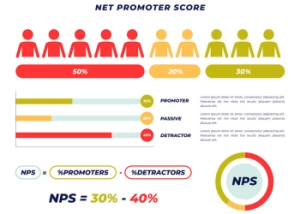Understanding eNPS in the UAE Workplace
In today’s fast-evolving business environment, companies in the United Arab Emirates (UAE) are striving not only to attract top talent but also to retain and engage them. With competition rising across industries from finance and consulting to technology and real estate business leaders are recognizing that employee satisfaction directly impacts business performance. One of the most effective ways to measure this satisfaction is through eNPS, or Employee Net Promoter Score.
What is eNPS All About?

The concept of eNPS (Employee Net Promoter Score) stems from the world of customer experience. Just as NPS (Net Promoter Score) measures customer loyalty, eNPS assesses employee loyalty and engagement by asking a simple yet powerful question:
“On a scale of 0 to 10, how likely are you to recommend this company as a great place to work?”
This single question provides deep insights into how employees feel about their organization. It helps business owners understand whether their workforce is motivated, engaged, and likely to advocate for the company or disengaged and at risk of leaving.
Why eNPS Matters in the UAE Context
The UAE has a highly diverse, multicultural, and mobile workforce. With global talent hubs like Dubai, Abu Dhabi, and Sharjah, employee expectations are rising. Factors such as career development, leadership transparency, flexible work culture, and recognition play a significant role in shaping employee sentiment.
eNPS helps UAE businesses:
- Track real-time employee satisfaction and engagement trends.
- Identify departments or offices where morale may be declining.
- Benchmark performance against industry peers.
- Strengthen employer branding in a competitive hiring landscape.
eNPS vs Traditional Employee Surveys
| Aspect | eNPS | Traditional Surveys |
|---|---|---|
| Focus | Measures overall loyalty and advocacy | Covers multiple HR and satisfaction aspects |
| Length | Single key question (+ optional follow-up) | Often long and time-consuming |
| Frequency | Can be done quarterly or bi-annually | Usually once a year |
| Actionability | Quick insights and trend tracking | Broad data but slower analysis |
Unlike long-form engagement surveys, eNPS offers simplicity, agility, and actionable insights, making it ideal for fast-paced UAE organizations.
Closing Thought
Understanding and improving Employee Net Promoter Score (eNPS) can transform how UAE companies view their workforce. Whether it’s a tax advisory firm in Dubai, a tech startup in Abu Dhabi, or a consulting company in Sharjah, eNPS empowers leaders to create a culture of trust, loyalty, and long-term success.
Q: Is eNPS suitable for small and medium-sized companies in the UAE?
A: Absolutely. eNPS works for organisations of all sizes. In fact, SMEs in Dubai and Abu Dhabi benefit the most because it provides quick, low cost insights into employee satisfaction without the need for complex survey tools or consultants.
What Is eNPS? How It Works & How to Calculate It

Understanding the Core of eNPS (Employee Net Promoter Score)
Employee Net Promoter Score (eNPS) is a simple yet powerful metric that measures employee loyalty, satisfaction, and advocacy within an organization. It tells you how likely your employees are to recommend your company as a great place to work, an indicator directly linked to engagement, retention, and overall company culture.
In essence, eNPS quantifies how your employees feel about their workplace in a single, clear number making it easy to monitor and act upon.
The eNPS Question
At its core, the eNPS survey revolves around one question:
“On a scale of 0 to 10, how likely are you to recommend this organisation as a great place to work?”
This simplicity is what makes eNPS so effective. The responses are divided into three categories:
- Promoters (9–10): Loyal and enthusiastic employees who advocate for the company.
- Passives (7–8): Satisfied but not particularly enthusiastic employees.
- Detractors (0–6): Unhappy employees who may negatively impact company morale and brand reputation.
How to Calculate eNPS
The eNPS formula is straightforward:
eNPS=(%Promoters)−(%Detractors)\text{eNPS} = (\% \text{Promoters}) – (\% \text{Detractors})eNPS=(%Promoters)−(%Detractors)
Example:
If 60% of employees are Promoters and 20% are Detractors:
eNPS=60−20=+40\text{eNPS} = 60 – 20 = +40eNPS=60−20=+40
This means your organisation has a strong positive employee sentiment.
Score Range:
- +50 or higher: Exceptional – strong company culture.
- +30 to +50: Healthy engagement.
- 0 to +30: Moderate – improvement needed.
- Below 0: Warning sign – disengagement issues.
eNPS vs Employee Satisfaction Score (ESS)
| Feature | eNPS | ESS (Employee Satisfaction Score) |
|---|---|---|
| Question Type | Loyalty-based (“Would you recommend?”) | Satisfaction-based (“How satisfied are you?”) |
| Purpose | Measures advocacy and loyalty | Measures happiness or contentment |
| Metric Range | -100 to +100 | Typically 1 to 5 or 1 to 10 |
| Insights Provided | Employee loyalty trends | Employee satisfaction levels |
| Ideal For | Tracking long-term culture health | Measuring short-term sentiment |
Key Takeaway:
While ESS shows how happy employees are, eNPS reveals whether they believe in your company enough to advocate for it. Both are valuable, but eNPS offers a broader view of loyalty and engagement.
Why Simplicity Matters
UAE-based companies, especially in fast-paced sectors like finance, tech, and consulting, benefit from quick, clear feedback loops. eNPS’s single-question format ensures:
- Higher response rates.
- Faster analysis and reporting.
- Easier communication of results to management.
- Actionable insights within days not months.
Q: What is considered a good eNPS score for UAE companies?
A: A good eNPS score generally starts at +10 or higher, showing more promoters than detractors. For UAE companies, especially in service and finance industries, a score above +30 is considered strong due to high workforce diversity and competitive job markets in Dubai and Abu Dhabi.
Why eNPS Matters The Business Impact in the UAE

The Power of Employee Advocacy
In today’s competitive UAE job market, employee advocacy is the ultimate brand differentiator. When your team genuinely believes in your organisation, they become ambassadors promoting your company to peers, clients, and potential hires.
That’s where eNPS (Employee Net Promoter Score) comes in. It reveals how deeply your employees are connected to your company and how likely they are to recommend it as a workplace of choice.
A strong eNPS is not just a number, it’s a sign of trust, engagement, and brand loyalty inside your workforce.
How eNPS Drives Business Performance
Employee engagement directly affects performance, retention, and profitability. Companies with high eNPS often experience:
- Higher retention rates: Engaged employees stay longer and perform better.
- Better customer satisfaction: Happy employees lead to happy customers.
- Stronger employer branding: Crucial in a competitive hiring environment like Dubai or Abu Dhabi.
- Lower recruitment costs: Word-of-mouth referrals from promoters reduce hiring expenses.
- Improved productivity: Motivated teams collaborate, innovate, and deliver results faster.
In short: eNPS is an early indicator of company culture and operational health.
Why eNPS Is Crucial for UAE Businesses
The UAE market is unique, fast-moving, multicultural, and driven by performance. eNPS provides a quantitative lens to assess how well your company adapts to these realities.
Specific reasons it matters for UAE-based companies:
- Diverse workforce: Helps understand satisfaction across nationalities and departments.
- High mobility: Identifies retention risks in industries with frequent job changes.
- Cultural alignment: Ensures alignment between global values and local operations.
- Employer reputation: In cities like Dubai, reputation travels fast employee advocacy can make or break talent attraction.
eNPS vs Traditional HR Metrics
| Metric | Measures | Limitations | Why eNPS Adds Value |
|---|---|---|---|
| Turnover Rate | Number of employees leaving | Doesn’t explain “why” | eNPS uncovers sentiment and motivation behind exits |
| Engagement Survey | Overall satisfaction | Often lengthy & infrequent | eNPS gives quick pulse feedback |
| Performance KPI | Output metrics | Ignores emotional engagement | eNPS measures emotional connection |
| Absenteeism Rate | Attendance patterns | Doesn’t gauge loyalty | eNPS reveals hidden morale issues |
By combining eNPS with these traditional HR metrics, UAE organisations can gain a 360° view of employee experience — from performance to perception.
Real-World Example
A Dubai-based professional services firm noticed a rising turnover trend. After implementing quarterly eNPS surveys, they found low scores among mid-level managers due to unclear career progression.
By launching targeted leadership programs, eNPS jumped from +12 to +46 in six months, saving significant recruitment costs and improving client satisfaction scores.
Q: Can eNPS help reduce employee turnover in the UAE?
A: Yes. eNPS identifies dissatisfaction and engagement gaps early, allowing HR teams to act before employees decide to leave. For UAE companies, where recruitment costs are high and talent competition is intense, this proactive insight helps retain top performers and strengthen company culture.
How to Implement eNPS A Practical Guide for UAE Businesses
Building an Effective eNPS Strategy
Implementing Employee Net Promoter Score (eNPS) is more than sending out a quick survey it’s about creating a continuous feedback culture that builds trust between leadership and employees.
For UAE-based companies, especially in fast-moving markets like Dubai, Abu Dhabi, and Sharjah, eNPS offers an agile way to understand what drives satisfaction and loyalty in a diverse workforce.
Step 1: Design a Simple and Clear Survey
Start by focusing on the core eNPS question:
“On a scale of 0 to 10, how likely are you to recommend this organization as a great place to work?”
To gain deeper insights, add one or two follow-up questions:
- “What’s the main reason for your score?”
- “What could we do to make this a better workplace for you?”
Tips for UAE companies:
- Use clear, multilingual communication (Arabic & English) to engage all employee groups.
- Keep it anonymous to ensure honest feedback.
- Use digital tools (like Officevibe, CultureAmp, or SurveyMonkey) for quick and easy participation.
Step 2: Conduct Regular Surveys
Consistency is key.
- Frequency: Quarterly or bi-annually works best.
- Sample size: Include all departments and levels.
- Benchmark: Track results against previous surveys and similar UAE industry standards.
Local Insight:
Because UAE workforces are highly mobile, regular pulse surveys help detect engagement issues before employees start looking elsewhere.
Step 3: Analyse the Results
Once you calculate the eNPS score, segment the results:
- By department or business unit.
- By location (e.g., Dubai HQ vs Abu Dhabi branch).
- By tenure or job role.
This segmentation helps identify where loyalty gaps exist and which teams are driving engagement.
Step 4: Take Action Turn Data into Improvement
Data without action is meaningless.
To truly benefit from eNPS:
- Share results transparently with teams.
- Create action plans for low-scoring areas.
- Celebrate improvements and recognise departments with rising scores.
- Involve leadership: Managers should lead engagement efforts through regular check-ins and recognition programs.
Key UAE Tip:
Many employees in Dubai and Abu Dhabi value career progression, recognition, and cultural inclusion. Addressing these factors based on eNPS feedback builds stronger loyalty and reduces turnover.
eNPS Implementation vs Traditional HR Programs
| Aspect | eNPS Program | Traditional HR Surveys |
|---|---|---|
| Time to Implement | Quick (within days) | Weeks or months |
| Employee Participation | High, due to short format | Low, due to survey fatigue |
| Actionability | Immediate insights | Delayed due to lengthy analysis |
| Focus | Loyalty & advocacy | General satisfaction metrics |
Step 5: Track Progress Over Time
eNPS is not a one-off initiative it’s a continuous improvement cycle.
- Compare scores quarterly.
- Identify long-term engagement trends.
- Link changes in eNPS to retention, productivity, and revenue growth.
Over time, you’ll build a data-driven culture where employees feel heard and valued.
Q: How often should UAE companies conduct eNPS surveys?
A: Ideally, eNPS should be conducted every 3 to 6 months. This frequency helps UAE companies monitor employee sentiment regularly, track improvement initiatives, and adapt strategies to dynamic workforce conditions especially in fast-changing industries like consulting, finance, and technology.
Limitations & Challenges of eNPS What to Watch Out For
Why Understanding eNPS Limitations Is Essential
While Employee Net Promoter Score (eNPS) is a powerful tool for gauging employee loyalty and engagement, it’s not a magic bullet. Many UAE companies, from financial consultancies to tech startups, adopt eNPS expecting it to solve every HR challenge — but like any metric, it has limitations that must be understood to use it effectively.
Recognising these challenges ensures that leaders interpret eNPS correctly and make data-driven, balanced HR decisions.
1. It’s Just One Question
The simplicity of eNPS is both its strength and weakness.
- eNPS tells you what employees feel, but not why they feel that way.
- Without follow-up questions or qualitative feedback, organisations risk acting on incomplete data.
Example:
A company may receive a low score, but unless it knows whether the cause is salary, leadership, or workload, it can’t design meaningful interventions.
2. Lacks Context Without Benchmarking
eNPS results mean little without context. A +20 score might be good in one sector but poor in another.
UAE businesses should:
- Compare results with industry benchmarks (e.g., finance, retail, consulting).
- Track trends over time rather than focusing on one number.
- Consider regional nuances for instance, expat employees may rate differently based on cultural expectations.
3. Doesn’t Measure All Engagement Drivers
eNPS focuses primarily on loyalty and advocacy, not the full scope of employee engagement. It doesn’t directly assess:
- Leadership quality
- Career development
- Compensation fairness
- Work-life balance
- Inclusion and cultural fit
Hence, pairing eNPS with employee satisfaction or engagement surveys provides a more complete view of workplace health.
4. Over-Reliance Can Lead to Missteps
Some companies make the mistake of treating eNPS as a final verdict on culture.
However:
- A high eNPS doesn’t always mean employees are productive or aligned with business goals.
- A low score doesn’t mean your culture is failing it might indicate temporary challenges.
The true value of eNPS lies in trend analysis and follow-up actions, not in one-time results.
eNPS vs Full Employee Engagement Analysis
| Aspect | eNPS | Comprehensive Engagement Analysis |
|---|---|---|
| Depth of Insight | Measures loyalty | Covers motivation, leadership, recognition, and satisfaction |
| Ease of Use | Simple and quick | Complex but detailed |
| Actionability | Quick wins | Strategic long-term planning |
| Ideal For | Regular pulse checks | Annual engagement reviews |
Tip for UAE Businesses:
Combine both methods use eNPS for quick tracking and detailed engagement surveys once a year for deeper analysis.
5. Cultural and Communication Barriers in the UAE
Given the UAE’s multicultural workforce, interpretation of the eNPS scale may vary:
- Some cultures rarely give 9–10 scores, even when satisfied.
- Others may avoid negative feedback due to workplace hierarchy.
Solution:
Ensure survey anonymity, translate questions into clear language, and educate teams on how to provide constructive feedback.
Q: What’s the biggest mistake UAE companies make when using eNPS?
A: The most common mistake is focusing only on the score instead of the actions that follow. eNPS is valuable only when companies analyse feedback, communicate results, and implement targeted changes. In the UAE, where workforce diversity adds complexity, combining eNPS with cultural insights and open communication delivers the best results.
Case Study How eNPS Transformed a UAE Company’s Employee Culture
The Challenge: High Turnover & Declining Morale
In early 2023, a Dubai-based professional services firm with over 250 employees noticed an alarming trend rising turnover rates and a drop in client satisfaction. Despite strong financial results, internal surveys showed that employees were feeling disconnected, undervalued, and unmotivated.
The HR leadership team wanted a fast, data-driven way to measure employee sentiment without launching a lengthy engagement survey. Their solution?
Implementing the Employee Net Promoter Score (eNPS) system.
The Implementation Journey
The HR team introduced a quarterly eNPS survey with a single question:
“On a scale of 0–10, how likely are you to recommend this company as a great place to work?”
They added two follow-up questions:
- “What’s the main reason for your rating?”
- “What changes would make your experience better?”
The survey was anonymous, available in English and Arabic, and conducted online for convenience. Within two weeks, the company received a 92% participation rate, indicating employees were eager to share feedback.
Findings & Insights
The first survey results were revealing:
- Overall eNPS: +12 (low engagement baseline)
- Key Issues Identified:
- Lack of career progression opportunities
- Inconsistent recognition from leadership
- Limited team communication
To address these issues, the company developed a three-month action plan, which included:
- Launching a career advancement framework with defined promotion paths
- Introducing a monthly recognition program for top performers
- Hosting cross-department collaboration sessions to enhance transparency
Results After Six Months
After implementing these initiatives, the company’s second eNPS survey told a very different story:
- eNPS improved from +12 to +46
- Employee turnover dropped by 30%
- Client satisfaction scores rose by 22%
- Referral-based hiring increased by 18%, as happy employees began recommending the company to peers
Emloyees also reported higher trust in leadership and better communication across departments — a direct result of acting on feedback, not just collecting it.
Before & After: eNPS Impact Comparison
| Category | Before eNPS Implementation | After eNPS Implementation |
|---|---|---|
| Employee Turnover | 28% annually | 19% annually |
| eNPS Score | +12 | +46 |
| Employee Recognition | Ad-hoc & inconsistent | Monthly structured program |
| Internal Communication | Fragmented | Regular cross-team meetings |
| Hiring Referrals | 8% of new hires | 26% of new hires |
Key Takeaway:
When leaders listen and act on feedback, eNPS becomes more than a metric—it becomes a catalyst for cultural transformation.
Lessons for UAE Businesses
- Action beats analysis: Acting quickly on survey results drives visible change.
- Transparency matters: Sharing results with staff builds trust.
- Localization is key: Using multiple languages and respecting cultural diversity improves response accuracy.
- Leadership involvement: When senior management participates, engagement scores rise faster.
For UAE organisations navigating hybrid work, high turnover, or cultural complexity, eNPS offers a clear roadmap to strengthen employee engagement.
Q: How long does it take for eNPS to show measurable results in a UAE organisation?
A: Typically, 3 to 6 months. When companies actively address feedback, UAE-based teams begin to show higher morale, better collaboration, and lower turnover within the first few survey cycles. Continuous communication and leadership follow-through are key to sustaining those gains.
Conclusion & Call to Action Building a Culture of Employee Advocacy in the UAE
From Insight to Action: What eNPS Truly Represents
The Employee Net Promoter Score (eNPS) isn’t just a metric — it’s a mirror reflecting your company’s internal culture. For UAE businesses competing in dynamic markets like Dubai, Abu Dhabi, and Sharjah, eNPS provides an efficient way to understand how employees feel, where improvements are needed, and how engagement connects directly to performance.
When employees proudly recommend your company as a great place to work, you don’t just have a loyal team — you have brand ambassadors who fuel long-term growth, innovation, and reputation.
Key Takeaways for UAE Organisations
- Measure regularly: Conduct eNPS surveys every quarter or twice a year to track engagement trends.
- Act decisively: Respond to feedback quickly; even small visible changes reinforce trust.
- Communicate openly: Share results transparently and highlight improvements to show employees their voices matter.
- Empower leadership: Train managers to interpret eNPS data and act with empathy.
- Blend quantitative and qualitative: Pair eNPS with open feedback sessions, engagement interviews, or pulse surveys for deeper insight.
- Localize your approach: In the UAE’s multicultural setting, ensure communication respects diverse backgrounds and languages.
When used strategically, eNPS becomes the foundation for a sustainable employee experience, one that enhances retention, productivity, and employer branding across the region.
How Kingsley Maybrook Can Help
At Kingsley Maybrook UAE, we believe that strong internal culture equals strong business performance.
Our advisory experts assist organisations in:
- Designing effective employee experience frameworks.
- Integrating eNPS and engagement analytics into HR systems.
- Aligning workforce sentiment with strategic business goals.
- Developing leadership programs that strengthen team trust and retention.
Whether you’re a growing SME or a regional enterprise, we can help you transform employee feedback into measurable business results.
Your Next Step: Turn Feedback Into Growth
Building a high-performing organisation in the UAE starts with listening to your people.
Let Kingsley Maybrook help you implement eNPS, interpret insights, and translate employee sentiment into long-term competitive advantage.
Contact our UAE consultants today to begin strengthening your employee engagement strategy.
Together, we’ll help you turn loyal employees into powerful advocates for your brand.
Q: How can Kingsley Maybrook support my company in launching an eNPS strategy?
A: Kingsley Maybrook provides end-to-end eNPS advisory from designing surveys and analysing results to aligning engagement data with HR and business objectives. Our UAE-based consultants ensure your approach is culturally adapted, data-driven, and results-oriented, helping you build a thriving, loyal workforce.

